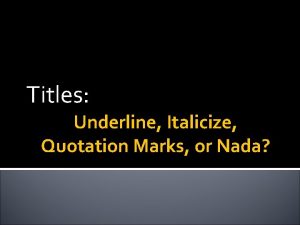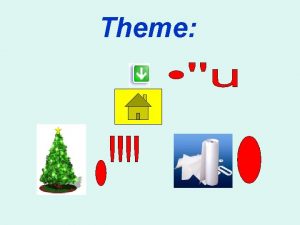JOURNALISTIC TRANSLATION TYPES OF JOURNALISM Newspapers daily events







- Slides: 7

JOURNALISTIC TRANSLATION

TYPES OF JOURNALISM • Newspapers – daily events and happenings, sometimes with political commentary of some kind. • Magazines – longer stories, usually with commentary, that appear on a weekly or monthly basis • Blogs and Websites – generally less-regulated, often culturally-specific accounts of events for a specific demographic/audience.

WHAT MAKES JOURNALISTIC TRANSLATION DIFFICULT? • Translating the news seems like it should be relatively easy at first glance. • Unlike songs, poetry, or even more standard prose literature, news stories generally aim at absolute clarity. • They are also usually written for a general audience; you aren’t expected to have an advanced degree to read a newspaper.

CULTURAL CONTEXT • As is often the case, what makes journalistic translation somewhat difficult is the question of cultural context. • Generally, journalists write with a particular audience in mind, ranging from a particular country to a particular city or a particular age group. Whether they mean to or not, they almost always make reference to common cultural knowledge that they assume their readers will understand.

EXAMPLES OF CULTURAL DIFFICULTIES • Units of measurement – An article written in French is likely to use the metric system, describing distances in kilometers, for example. An English or American paper would be more likely to use the English unit of miles. • Names – Specific events, people, or buildings might have different titles in French and English that do not translate exactly. For example, the American Civil War is usually called La guerre de Sécession in French. • Political Expressions – Within countries, certain expressions often indicate something more specific than the meaning of their individual words. If you say “the healthcare debate” in the United States, people know you mean the debate over Barack Obama’s healthcare policy.

POLITICAL SENSITIVITY • Words used in everyday political discourse can often be imbued with a particular meaning in different cultures/languages. Translators have to be aware of this so they do not accidentally say something stronger than they mean. • For example, the main French left-wing party is the PS (Socialist Party). Barack Obama is a left-leaning politician in the United States, but if you compared him to a socialist in the US, people would think you were trying to attack/insult him.

LINGUISTIC CONSIDERATIONS • Linking words – These are particularly important to translate correctly, because even small variations can dramatically change the meaning of a sentence. • Ex. Although, but, from, even (Bien que, mais, de, même) • Verbs – Small changes in verb forms can also result in larger changes in meaning that must be carefully observed. • Ex. can (pouvoir – present), may (pouvoir – present or il est possible que), must (devoir or Il faut que), should (devoir – conditional)











